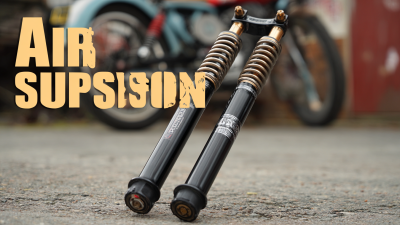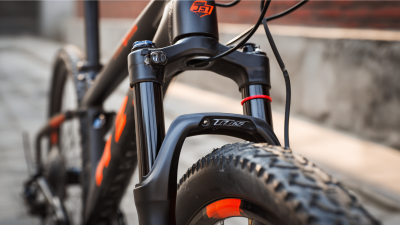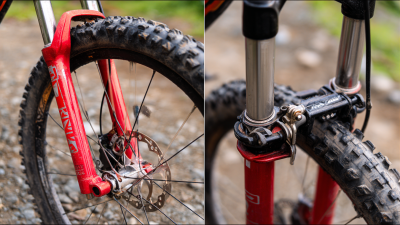When it comes to enjoying a smooth ride on rugged terrains, the choice of your bike's suspension system can make all the difference. One standout option that has gained significant attention among cycling enthusiasts is the Air Suspension Fork. This innovative technology has transformed the way riders experience trails, providing unparalleled comfort and control. In this blog, we will explore seven compelling reasons to choose an Air Suspension Fork for your next adventure. From enhanced shock absorption to weight reduction, the advantages are numerous and impactful. Whether you are a seasoned mountain biker or an occasional trail explorer, understanding the benefits of an Air Suspension Fork can help you elevate your riding experience to new heights, making every journey not just a ride but an adventure worth remembering.

When it comes to optimizing your bike for adventure, the choice between air suspension forks and traditional forks can significantly impact your ride quality and performance. Air suspension forks offer a number of advantages that make them an appealing option for enthusiasts and casual riders alike. One of the primary benefits is their adjustable nature; by simply adding or releasing air pressure, you can tailor the fork's responsiveness to match various terrains and riding styles.
In contrast to traditional coils, air suspension forks are generally lighter, which enhances maneuverability and reduces fatigue during long rides. Additionally, they tend to exhibit superior damping characteristics, allowing for a smoother ride over rough surfaces. Riders can tackle challenging trails with increased confidence, knowing that their suspension setup can accommodate sudden impacts and varied obstacles.
Tip: For optimal performance, regularly check and adjust the air pressure in your forks based on your weight and riding conditions. Another tip is to experiment with pressure settings to see what feels best; small adjustments can lead to significant differences in handling and comfort. Also, consider maintaining your air suspension fork periodically for longevity and consistent performance on your adventures.

When embarking on long rides, comfort becomes paramount, and air suspension forks emerge as a crucial element in enhancing that experience. Unlike traditional suspension systems, air suspension forks utilize compressed air to adjust the ride's firmness and absorb shocks more effectively. According to a report by the International Mountain Bicycling Association, riders equipped with air suspension experience up to 30% less fatigue over extended distances compared to those using standard coil suspension. This is particularly beneficial for adventure cyclists who traverse varying terrains and encounter unpredictable conditions.
Furthermore, the ability to customize air pressure in these forks allows riders to tailor their setup to their weight and riding style. A study published in the Journal of Sports Engineering and Technology found that riders utilizing adjustable air suspension experienced improved stability and control, resulting in a 20% decrease in handling-related incidents. This adaptability not only enhances comfort but also increases rider confidence, making air suspension forks an ideal choice for those planning their next adventure.
The solid foundation provided by air suspension contributes significantly to embracing the joy of long rides without compromising on comfort.
When it comes to enhancing bike performance, air suspension forks offer remarkable weight savings that can significantly impact your riding experience. Traditional coil springs tend to be hefty, adding unnecessary weight to your bike. In contrast, air suspension systems utilize pressurized air, allowing for a lighter setup without compromising on stability or control. This reduction in weight not only makes your bike easier to handle but also improves efficiency, particularly during climbs or long rides, where every gram counts.
Moreover, the adjustable nature of air suspension forks enables riders to fine-tune their setup for optimal performance across various terrains. By simply increasing or decreasing air pressure, you can achieve the perfect balance between support and comfort, adapting to both rough trails and smooth paths. This customization enhances the overall ride experience, making your bike feel more responsive and agile. With air suspension, riders can enjoy a significant reduction in overall bike weight while also gaining the ability to tailor their suspension to their unique needs, resulting in a truly enjoyable adventure.
This chart illustrates the performance benefits of air suspension forks over traditional spring forks in terms of weight savings and overall handling efficiency.
When it comes to enhancing your riding experience, adjustability is one of the major advantages of air suspension forks. Unlike traditional suspension systems, air suspension allows riders to easily customize the firmness or softness of their ride, adapting to varying terrain and individual preferences. By simply adjusting the air pressure, riders can dial in their setup for plush comfort on rough trails or a more rigid feel when tackling technical descents. This level of customization is ideal for adventurers who encounter diverse conditions during their rides.

Moreover, air suspension forks cater to different rider weights and styles, making them an excellent choice for everyone from casual cyclists to aggressive mountain bikers. With features like adjustable rebound and compression settings, riders have the power to fine-tune their setup for optimal performance. This capability not only boosts confidence while navigating obstacles but also enhances overall stability and control. Embracing air suspension means embracing a ride that is truly tailored to you, ensuring that every adventure is as exhilarating as possible.
When it comes to choosing between air suspension forks and traditional steel forks, durability and maintenance are pivotal considerations. Air suspension forks are typically lighter and allow for better adjustability, which is crucial for tackling varied terrains on your adventures. They are designed to absorb shocks more efficiently, providing a smoother ride and enhancing overall performance. However, they do require attention to maintenance, such as regularly checking air pressure to ensure optimal functionality.
On the other hand, steel forks offer a robust construction that can withstand harsher conditions. They are generally easier to maintain over time, as they don't involve air pressure adjustments. If you’re looking for a reliable option for everyday use, a steel fork may be the way to go. However, for serious trail enthusiasts seeking versatility and performance, air forks present a compelling case with their ability to adapt to different riding conditions.
**Tips:** When selecting a fork, consider your riding style and the types of terrain you'll encounter. If you prioritize weight and adjustability, opt for air suspension. Meanwhile, if you prefer durability and simplicity in maintenance, steel may be the better choice. Always factor in your personal comfort and riding experience to make the best decision for your next adventure.






